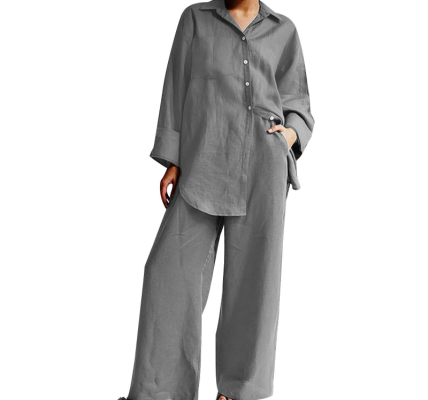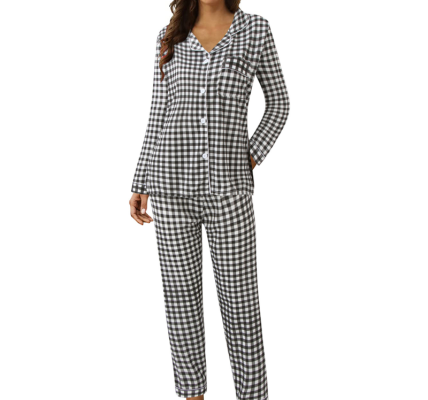We all love crawling into a cozy pair of pajamas after a long day. But how often laundry pajamas to maintain that feeling of freshness and hygiene? Believe it or not, there’s no one-size-fits-all answer to this question. Several factors influence how often you should wash your sleepwear, and this guide will explore them all to help you establish a laundry routine that keeps your PJs clean and comfortable.
Factors to Consider When Washing Pajamas

- Frequency of Wear: This is the most crucial factor. If you wear your pajamas every night, they’ll naturally accumulate more sweat, dead skin cells, and dust mites than if you only wear them occasionally. According to a 2024 survey by the National Sleep Foundation, nearly 70% of Americans wear pajamas every night, highlighting the importance of regular washing.
- Activity Level While Sleeping: Do you tend to toss and turn or sweat heavily at night? High activity levels during sleep will necessitate more frequent washing.
- Showering Habits: If you shower before bed, your pajamas will stay cleaner for longer. Showering removes sweat and dirt, reducing the amount transferred to your sleepwear.
- Material: Lightweight, breathable fabrics like cotton tend to require less frequent washing compared to heavier flannel pajamas. Flannel traps more sweat and needs washing after a few wears.
- Underwear: Wearing underwear beneath your pajamas can act as a barrier, extending the time between washes.
How Often to Wash Your Pajamas: A Breakdown
Here’s a general guideline based on the factors mentioned above:
- Daily Wear: If you wear your pajamas every night, washing them after each use is ideal. This is especially true if you shower in the morning, sweat heavily at night, or have allergies.
- Every Other Night: If you shower before bed, have moderate activity levels during sleep, and wear underwear beneath your PJs, washing them every other night might suffice.
- Twice a Week: For those who wear pajamas only a couple of nights a week, washing them twice a week should be sufficient, especially if they’re made from breathable fabrics.
Additional Tips for Keeping Your Pajamas Fresh

- Air them out: After wearing your pajamas, hang them up to air out instead of tossing them in the laundry basket. This helps prevent musty odors and allows sweat to evaporate.
- Spot clean: For minor spills or stains, spot clean them with a gentle laundry detergent to avoid a full wash.
- Rotate your PJs: Having multiple pairs of pajamas allows you to wear them on alternate nights, giving each pair a chance to air out before the next wear.
- Wash in cold water: Hot water can damage delicate fabrics and shrink pajamas. Opt for cold water to preserve the shape and color of your sleepwear.
- Gentle cycle: Use the gentle cycle on your washing machine to prevent excessive wear and tear on your pajamas, especially those made from delicate materials like silk.
- Skip the fabric softener: Fabric softener can leave a residue on your pajamas, making them less breathable.
Signs You Need to Wash Your Pajamas More Often
- Visible stains or spills: This is a no-brainer. Wash your pajamas immediately if you get any spills or stains on them.
- Unpleasant odors: If your pajamas start to smell musty or sweaty, it’s time for a wash.
- Skin irritation: Dirty pajamas can trap dead skin cells and bacteria, leading to itching and irritation.
- Visible dirt or dust: If you notice visible dirt or dust on your pajamas, it’s definitely laundry day.
The Importance of Clean Pajamas for Sleep Quality
Clean pajamas contribute to a good night’s sleep in several ways:

- Improved Hygiene: Clean PJs prevent the buildup of sweat, dead skin cells, and dust mites, which can irritate your skin and disrupt sleep.
- Reduced Allergies: Dust mites thrive in dirty bedding and pajamas. Washing your sleepwear regularly can alleviate allergy symptoms and promote better sleep.
- Enhanced Comfort: Fresh pajamas feel better against your skin, creating a more comfortable sleep environment.
- Psychological Benefits: Crawling into clean pajamas can signal to your brain that it’s time to wind down and prepare for sleep.
Finding the Perfect Pajamas for a Clean and Comfortable Sleep
- Fit: Pajamas shouldn’t be too tight or too loose. Loose-fitting pajamas allow for better airflow and comfort, while excessively loose PJs can bunch up and disrupt sleep. Opt for a relaxed fit that allows for ease of movement.
- Temperature Regulation: Consider the climate you live in and choose pajamas accordingly. Lightweight fabrics like cotton or linen are ideal for warmer weather, while flannel pajamas offer warmth during colder months.
- Style: While comfort is paramount, don’t underestimate the importance of style! Choose pajamas you feel good wearing. This can contribute to a positive bedtime routine and a better night’s sleep.
Beyond Pajamas: Additional Tips for Sleep Hygiene
Creating a clean and healthy sleep environment goes beyond just washing your pajamas. How often laundry pajamas? Here are some additional tips to promote good sleep hygiene:

- Maintain a consistent sleep schedule: Go to bed and wake up at roughly the same time each day, even on weekends. This helps regulate your body’s natural sleep-wake cycle.
- Create a relaxing bedtime routine: Develop a calming routine before bed, such as taking a warm bath, reading a book, or practicing light stretches. Avoid stimulating activities like watching TV or using electronic devices for at least an hour before bedtime.
- Optimize your sleep environment: Make sure your bedroom is dark, quiet, and cool. Invest in blackout curtains, earplugs, and a comfortable mattress to create a sleep-conducive environment.
- Limit daytime naps: While a short power nap can be beneficial, long daytime naps can disrupt nighttime sleep. Avoid napping for more than 20-30 minutes during the day.
- Regular exercise: Regular physical activity can improve sleep quality. However, avoid strenuous exercise close to bedtime, as it can be stimulating.
- Manage stress: Chronic stress can significantly impact sleep. Practice relaxation techniques like meditation or deep breathing to manage stress levels and promote better sleep.
Don’t Just Wash, Refresh! Tips for Extending the Life of Your Pajamas
Washing your pajamas regularly is crucial for maintaining hygiene and sleep quality. However, frequent washing can also wear down your favorite sleepwear. Here are some tips to extend the life of your pajamas and keep them looking and feeling fresh for longer:
- Pre-treat stains: Act quickly! The sooner you pre-treat stains, the easier they are to remove and the less likely they are to set. Use a gentle stain remover specifically designed for delicate fabrics if your pajamas are made from silk or other delicate materials.
- Turn PJs inside out: Turning your pajamas inside out before washing helps protect the outer layer from excessive wear and tear.
- Use a mesh laundry bag: This protects delicate pajamas from snags and tears during the wash cycle.
- Skip the dryer: Excessive heat from the dryer can shrink and damage pajamas. Whenever possible, opt for air drying. Hang your pajamas on a clothesline or drying rack in a well-ventilated area.
- Fluff and fold: Once your pajamas are dry, give them a gentle shake to restore their shape. Fold them neatly and store them in a cool, dry place. Avoid storing them in damp or cramped spaces, as this can promote mildew growth.
Beyond Cotton: Popular Pajama Fabrics and Care Tips
How often laundry pajamas? Cotton is a popular choice for pajamas due to its breathability and comfort. However, other fabrics offer unique benefits:

- Linen: Linen is a natural fabric known for its exceptional breathability and cooling properties. It’s a great choice for hot sleepers. However, linen wrinkles easily and requires special care instructions.
- Flannel: Flannel is a soft and warm fabric ideal for colder weather. However, flannel traps heat and requires more frequent washing than other fabrics.
- Silk: Silk pajamas offer a luxurious feel and promote temperature regulation. However, silk is delicate and requires handwashing or dry cleaning.
Remember to always check the care label on your pajamas for specific washing instructions.
Embrace the Comfort: Benefits of a Consistent Sleep Routine
We’ve emphasized the importance of washing your pajamas for optimal sleep hygiene. But creating a consistent sleep routine offers even greater benefits:
- Improved sleep quality: A consistent sleep schedule regulates your body’s natural sleep-wake cycle, leading to deeper, more restorative sleep.
- Enhanced focus and alertness: Regular sleep patterns improve cognitive function and concentration, allowing you to tackle your day with renewed energy.
- Boosted mood: Getting enough quality sleep can significantly improve your mood and reduce symptoms of anxiety and depression.
- Strengthened immune system: Sleep plays a vital role in immune function. A consistent sleep routine helps your body fight off illness and infection more effectively.
- Increased energy levels: Feeling well-rested throughout the day translates to improved energy levels and better overall health.
By incorporating these tips into your sleep routine, you can create a healthy sleep environment that promotes better sleep quality and overall well-being.
Sweet Dreams Start with Clean Pajamas
By following the tips outlined in this guide, you can establish a pajama washing routine that keeps your sleepwear clean and fresh, promoting better sleep hygiene and a more restful night’s sleep. Remember, investing in quality pajamas made from breathable fabrics and creating a relaxing sleep environment are equally important for achieving optimal sleep quality. So, prioritize your sleep health, wash your pajamas regularly, and drift off to dreamland feeling clean, comfortable, and ready for a restful night’s sleep.




